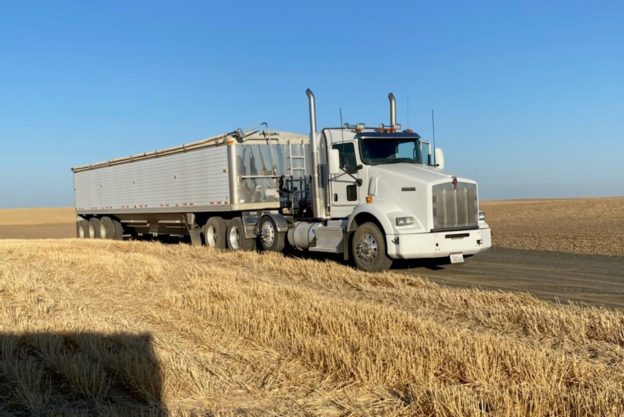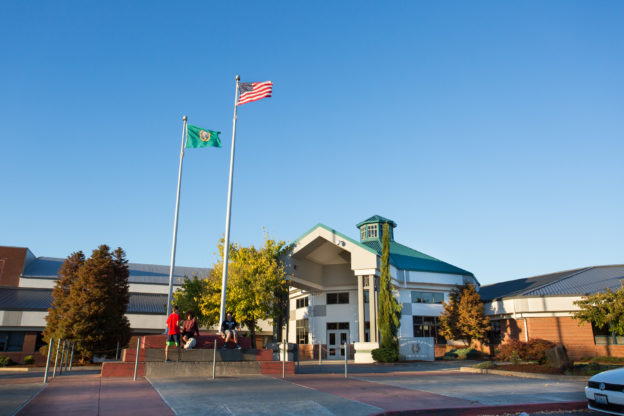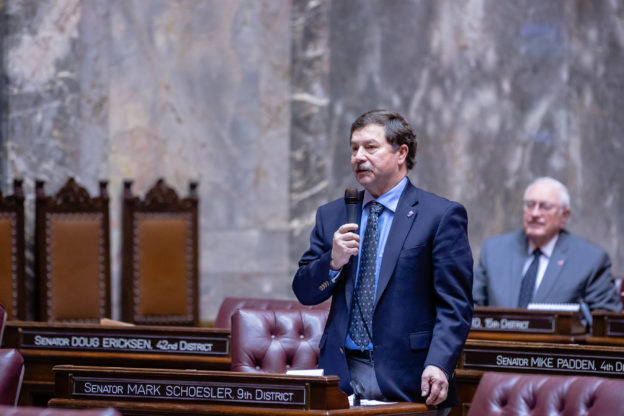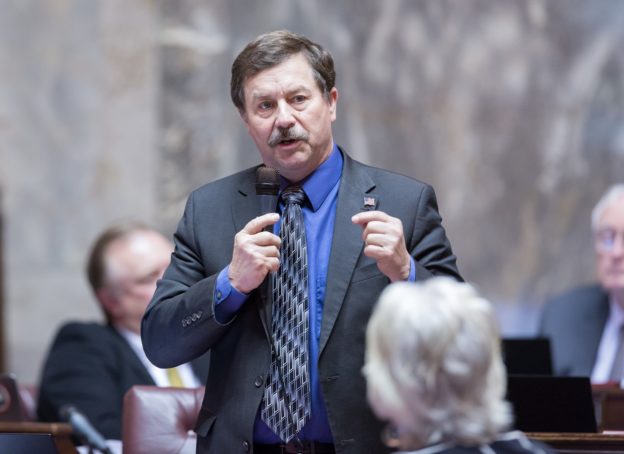Author Archives: brianzylstra
When the Climate Commitment Act was passed by majority Democrats in 2021, creating a “cap-and-tax” program for greenhouse gas emissions that is expected to significantly raise fuel prices, the measure included an exemption for farmers and other groups from paying the surcharge created by the program.
But since the law was implemented by the state Department of Ecology on Jan. 1 of this year, the expected exemption for farm diesel and fuel used by the maritime industry has not taken effect, angering farmers and others who expect to benefit from it.
A pair of eastern Washington Republican senators is sponsoring a bill that aims to fix the problem.
Senate Bill 5728 would develop a process to implement exemptions for farm diesel and other certain fuels under the “cap-and-tax” program. It has been sent to the Senate Environment, Energy and Technology Committee. No public hearing has been scheduled.
“When the Climate Commitment Act was being drafted, we were told famers would receive an exemption and not pay higher fuel taxes. That did not happen,” said the bill’s prime sponsor, 16th District Sen. Perry Dozier, R-Waitsburg. “The Department of Ecology should be responsible for finding a solution to ensure that farmers and the maritime industry are not burdened with the higher fuel costs as a result of the cap-and-tax legislation.”
“After I learned that the farm-fuel exemption had not been implemented, I asked the Department of Ecology why,” said 9th District Sen. Mark Schoesler, R-Ritzville. “DOE officials have blamed “Big Oil” for the lack of an exemption so far. They also say this exemption will be extended this summer, apparently forgetting that farm work goes on well before summer. The exemption on fuel for the agriculture and maritime industries needs to take effect now, not months from now.”
Under the proposal, DOE and the Department of Revenue must create a method to determine the additional amount paid by an end user of exempt fuel, such as a farmer, due to a fuel supplier’s compliance obligation. Compensation to an end user must be paid no later than 14 days after DOE receives an application for reimbursement.
For the fifth straight year, 9th District Sen. Mark Schoesler has a measure before the Legislature that aims to help school districts in Washington address their building-maintenance needs.
Senate Bill 5403 would allow school districts to create a “depreciation subfund” that can receive a transfer of up to 2 percent of a school district’s general fund each fiscal year.
“This bill would provide another path for school districts to handle building- or facility-maintenance needs,” said Schoesler, R-Ritzville. “Sometimes it can be better for a school district to pay cash for a building repair or to set aside money for emergencies when they arise. Establishing this subfund, which is voluntary, is a way to help students learn in a healthy environment since school buildings would be in better condition.
“School administrators have recognized the value of this proposal, and I’m optimistic that my colleagues in the Senate and House will agree and vote to approve it this year.”
The bipartisan proposal has been assigned to the Senate Early Learning and K-12 Education Committee for consideration.
During the 2021 and 2022 legislative sessions, the Senate twice easily passed an earlier version of Schoesler’s bill. Senate Bill 5202 reached the House Rules Committee and was placed on the House floor calendar in both sessions before stalling.
Schoesler introduced a similar measure during the 2019 and 2020 sessions, but it was not passed by the Senate.
Two environmental laws from the Democratic-controlled Legislature and Gov. Jay Inslee that took effect Jan. 1 are already causing fuel prices in Washington to rise, says state Sen. Mark Schoesler, R-Ritzville.
Schoesler, who represents eastern Washington’s 9th Legislative District, said he was notified by the Washington Independent Energy Distributors Association. that wholesale gasoline and diesel prices have risen in Washington as a result of the “cap-and-tax” law and the law creating a low-carbon fuel standard. Both laws were passed by the Legislature in 2021 but did not take effect until now.
Schoesler said wholesale fuel numbers he saw this week revealed gasoline prices had increased by 33.06 cents a gallon due to the “cap-and-tax” law and by 1.54 cents per gallon because of the low-carbon fuel standard. Meanwhile, the wholesale price of a gallon of diesel rose by 42.35 cents as a result of cap-and-tax and by 1.46 cents due to LCFS. Schoesler noted heating-fuel prices also have sharply increased in recent days, with more than two months of winter ahead.
“The wholesale fuel prices that I saw clearly show that ‘cap-and-tax’ and the low-carbon fuel standard are forcing fuel prices to increase at eastern Washington gas stations, and western Washington gas stations likely will see a similar hike. This contradicts claims by the governor and some of his allies that ‘cap-and-tax’ and LCFS will cause fuel prices to go up by only a few cents a gallon.
“Ever since these two laws were passed by the Democrats and signed by the governor, I’ve warned that they will force fuel prices to significantly increase. Now that these laws have gone into effect, we’re seeing that they indeed are causing hikes in fuel and heating-oil prices. This will hurt nearly everyone – commuters, parents taking their kids places, truckers and delivery drivers, and those working in agriculture. These increases will act like a gas-tax hike, but with no guaranteed benefits for our roads and highways.”
State Sen. Mark Schoesler, R-Ritzville, issued this statement in response to news that former Washington State University head football coach Mike Leach died Monday night in a Mississippi hospital following a massive heart attack.
“I had the privilege of meeting Mike Leach when he was the head coach at WSU. He was a great character in the world of college football and one of its most innovative and creative offensive minds. During his years as WSU’s head coach, his ‘Air Raid’ offense not only piled up yardage but it was very entertaining to watch. His success along the sideline was matched by his outspoken nature whenever he gave interviews. During his eight seasons in Pullman, he made the Cougars relevant. This is a sad day for Cougar Nation and college football fans. My thoughts and condolences go to his family, his current and former players and current and former assistant coaches.”
Leach was Washington State’s head coach from 2012 through 2019. During his eight seasons in Pullman, he led the Cougars to a 55-47 record. His most successful season was in 2018, when WSU finished with an 11-2 record and a win in the Alamo Bowl.
Leach left WSU and became the head coach at Mississippi State in 2020. In his three seasons at MSU, he compiled a 19-17 record. Prior to becoming Washington State’s coach, Leach coached 10 seasons at Texas Tech, where he had an 84-43 mark.
Schoesler is the state senator for the 9th Legislative District, which includes Pullman, where WSU’s main campus is located.
State government, including the Legislature, needs to do more to help combat the increase in retail crime in Washington, says 9th District state Sen. Mark Schoesler.
“While we’ve seen a spike in many areas of crime, retail theft and other retail crimes are especially a problem,” said Schoesler, R-Ritzville. “Retail crimes hurt not only stores and shops, but also consumers because these crimes force retailers to raise prices. The Legislature, the governor and the attorney general need to take action to greatly reduce retail crime in Washington.”
From 2019 to 2020, the value of goods stolen from Washington stores more than doubled. The Washington Retail Association estimates organized crime groups stole $2.7 billion from retailers in 2021.
“Retailers have been forced to endure an increase in crimes occurring on their property, including theft and fraud,” said Schoesler, R-Ritzville. “Organized retail-theft rings have become more brazen, violent and sophisticated in targeting stores. They are putting the safety of customers and store employees in danger. Also, they’re often involved in other crimes within communities, including human trafficking, money laundering and narcotics. These theft rings go after not only stores and shops in big cities but also those in small towns. It’s a growing problem in many parts of our state and the U.S.”
Schoesler, a member of the Senate Labor, Commerce and Tribal Affairs Committee, said the Washington Retail Association recently released a resource guide on how to deal with retail crimes.
“Retail crimes, especially theft, have become so much worse in recent years that the Washington Retail Association just released a retail-crimes resource guide for its members,” added Schoesler. “To me, that says the state isn’t providing enough help for retailers and local and state law enforcement agencies don’t have enough officers to effectively combat retail theft.”
The Senate Labor, Commerce and Tribal Affairs Committee last week held a work session on retail crimes.
“The work session was a sign that organized retail crime is on the Legislature’s radar screen, but we need to make it a high priority when the legislative session starts in January,” said Schoesler.
A national report on the impact of organized retail crime showed that Washington retailers lost just over $2.7 billion worth of goods and products due to theft in 2021, and that the per capita amount of stolen items in the state is $376.61, which ranks Washington second in the nation, only behind Pennsylvania ($436.25).
According to the 2021 state crime report released by the Washington Association of Sheriffs and Police Chiefs, 23,323 shoplifting cases were reported last year.
According to respondents to a 2022 retail security survey conducted by the National Retail Federation, Loss Prevention Research Council and Appriss Retail, organized retail-crime incidents have increased by 26.5%. The same survey reported that more than 81% of participating retailers said organized retail-crime offenders are somewhat or much more violent compared with one year ago.
In 2021, Seattle ranked eighth among large cities affected by organized retail crime.
The statewide transportation package passed primarily by Puget Sound-area Democrats in March is now fully subsidizing public-transit and state-ferry travel in some parts of the state for anyone 18 or younger. An eastern Washington legislator, 9th District Sen. Mark Schoesler, says the free-rider program discriminates against kids in rural Washington.
“Unfortunately, this is another example of how the Democratic majority preaches about ‘equity’ without truly practicing it,” said Schoesler, R-Ritzville. “They had to know offering free transit and ferry rides would benefit primarily kids in populous areas, rather than kids in rural counties, even though rural families help pick up the tab.”
Eight Puget Sound-area public-transit agencies began offering free youth fares last week. Other agencies statewide that implement a zero-fare program for riders 18 and under by Oct. 1 will also receive subsidies in the form of grants under the so-called Move Ahead Washington transportation package.
Schoesler also said most Washington motorists won’t be able to benefit from maintenance projects that are underway on parts of Interstate 5, I-405, I-90 and several state highways in King, Snohomish, Skagit and Whatcom counties, even though they are helping to pay for the projects through the Move Ahead Washington package and the “cap-and-tax” legislation approved by Democratic majorities in the Legislature.
“I know the Puget Sound counties have important highway maintenance needs, but so do other parts of our state. I’d like to see the Department of Transportation be as committed to completing highway projects in eastern Washington as it is for the Puget Sound region. We pay taxes and fees, too,” said Schoesler.
“Governor Inslee has been playing up the free transit rides to kids and the Puget Sound-area highway projects. Instead of focusing on programs and projects that mainly help out his supporters, the governor should focus more on the transportation needs of the entire state,” added Schoesler.
















